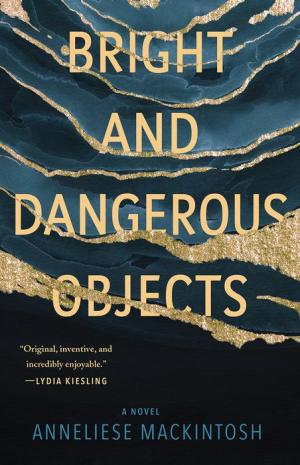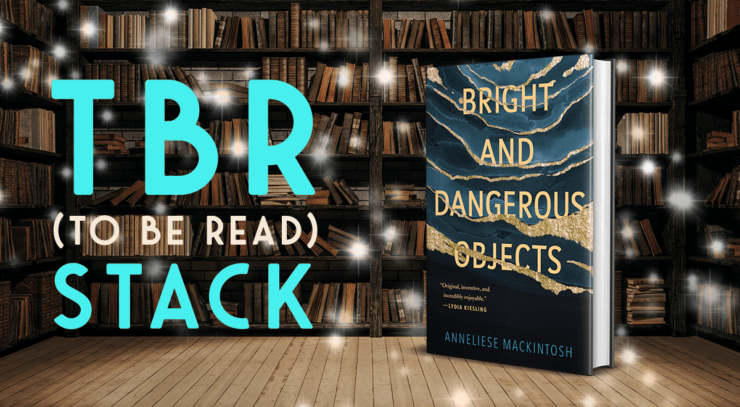I stand in the taxi queue, breathing in the cold air, then breathing out the steam from inside my lungs. I like exhaling steam. It makes me feel like a machine. When I’m in the diving chamber, I’m no longer human. I’m a cog.
So muses Solvig Dean, the protagonist of this month’s TBR Stack book, Bright and Dangerous Objects. Anneliese Mackintosh’s debut novel is a quiet, meditative novel about turning points—the kind of moments in life that change the texture of your reality. Solvig, a thirty-something deep-sea diver, is currently weighing two such moments: have a child? Or join a one-way mission to Mars?
Is it possible to want two vastly different things equally? Can Solvig find a way to have them both?
In Bright and Dangerous Objects, the trip to Mars is the ticking clock behind every decision Solvig Dean makes. Solvig is my favorite kind of protagonist: a person who is still learning, and trying to figure herself out, while pushing against society’s expectations in ways that are both active and passive. She’s tall, dresses casually, doesn’t wear jewelery, and works as a deep-sea diver/welder. She’s usually the only woman on crews of guys who make dark jokes and rib each other constantly—but we only encounter one instance where she seems to be targeted for extra teasing because she’s a woman. She works in the oil industry because they’re the ones who have diving jobs, but she’s conflicted and guilty about it. She has a male partner, a tattoo artist named James, but neither of them have any interest in marriage, and they’ve built a seemingly-contended life around her month-long gigs in the North Atlantic.
But in the midst of this tranquility, James asks Solvig if she’d like to have a child with him. She realizes that she thinks she does. She’s a little old to start trying, and soon their lives revolve around neonatal vitamins, ovulation cycles, and her near-constant interrogation of her own desires. But it’s worth it, and the more she imagines having a child the stronger the desire becomes.
The only thing Solvig wants as much as a kid, in fact, is to be one of the first people on Mars.
Buy the Book


Bright and Dangerous Objects
I’m fascinated by space exploration. I think the space race, and the later media interpretations of it, tell such an interesting story about the U.S. and its relationship to the rest of the world. I think it’s a cool way to look at how we think about and perform gender. And for me, personally, one of my greatest fears, honestly, is being pushed out of an airlock into the vacuum of space.
Now, unless Jeff Bezos kidnaps me and drags me along on his (ludicrous, soul-crushing, how many people could we feed and house???) voyage into the heavens, this is very unlikely. I’ve always sucked at any science that didn’t involve knowing a lot about animals, and my brain is wired in this super fun way that renders any math above about a third grade-level unfathomable. But for whatever reason, since I was a very small kid, this fear has lurked in the back of my mind. (I saw Alien when I was 10? Maybe that was it?) But because of this, I’ve always been interested in stories where it’s a possibility. Since coming to work at Tor.com, I’ve written about the space program a lot, I’ve reviewed Gravity, The Martian, and First Man, I used to review The Expanse with Molly Templeton, in which getting “spaced” is capital punishment.
THAT was fun.
All of this is to say that I’ve loved the recent trend of using space exploration as tool for existential musing. Gravity and First Man were both as much about grieving and parenthood as they were about rockets. Jaroslav Kalfar’s A Spaceman of Bohemia was about the ways people’s lives are crushed by history. Even Andy Weir’s fairly lighthearted Project Hail Mary featured some long meditations on the nature of bravery.
The journey to Mars has obviously been based on the Mars One expedition. The company in Bright and Dangerous Objects also emphasizes social media and reality TV as an organic part of the mission, both to get publicity and help with funding. (One of the things I found most interesting reading this book in 2021 was how much more natural that part of it felt to me now—I remember rolling my eyes at Mars One’s plan for a reality show back in 2012.) There are arguments between Solvig and her best friend over whether even considering this mission is a sign of Solvig having some sort of collapse. But as the book goes on, even that nod to realism falls away in favor of Solvig’s journey inward. What matters is that she throws herself into preparation, and she begins to think seriously about the idea of leaving the planet on a one-way trip in a decade, and what that would do to her as a person.
In one of the book’s best sequences, Solvig attends an information session hosted by the mission. Young people in literal tinfoil hats sit next to scientists who are weighing the ways their skills could contribute to a colony, and what’s lovely is that neither Solvig nor the book seem to judge any of them too much. All of them are excited by the prospect of a Mars Colony; the idea is kinda crazy: both things are true. Of course Solvig, with her years of diving, is an ideal candidate. She’s used to extreme physical pressure, and to being locked in small spaces with her coworkers for extended periods of time. But do any of her qualifications matter, if this is project is just a publicity stunt?
Now, back to death in space: one of the things I appreciated in Bright and Dangerous Objects is the way Mackintosh writes a truly ground-level space enthusiast. Solvig wants to go to Mars more than she wants anything. However, she is not an astronaut, or a physicist, or a computer programmer. She’s a welder who welds underwater. Her research is made up of podcasts, documentaries, and what she can find online (just like mine would be if I was going to apply for this mission) and after watching and reading so many astronaut stories it was refreshing to see a regular person walk themselves through the first steps of a career in space. For instance, during a team-building exercise the candidates have to weigh potential crewmembers’ skills versus the need to jettison people to lighten a rocket, and Solvig responds pretty much the way I would:
I once read a Mental Floss article about what happens if you suddenly find you have been spewed out into space without adequate protection. You will suffer horrific sunburn, while at the same time being subjected to an agonising chill. You will fill up with gas bubbles and double in size. The moisture on your eyes and in your mouth will boil. If you hold your breath, you lungs will rupture. If you don’t, you’ll suffocate.
I turn to the people at my table, scanning name badges. Who do I want to kill?
The leader of the project gives an enthusiastic presentation about how the mission is going to pick candidates, and explains that they all need to be “Martians” as she shares this acrostic:
Mars-obsessed
Ambitious
Resilient
Trusting/trustworthy
Inquisitive
Adaptable
Nice
Sense of humour
And what I love about this, other than that I can see this conference room, and I know exactly what this woman sounds like, and I appreciate the Kirkland-brand Ted Talk vibes on display here, is Solvig’s reaction. Does she scoff at the slide? Does she get up and leave, like I would?
Nope. Even in the face of this ridiculous list, the Mars project makes her euphoric. She wants to measure up, and be chosen, whatever that means, and what she really gets stuck on is the last item. She realizes that he hasn’t given much thought to having a sense of humor. How can she define hers? What role would it play in the mission? I love a book that gives us a thirty-something woman who is still figuring herself out to such an extent that she stops and ruminates on her own sense of humor.
It also gave me even more appreciation for the way fiction about space exploration, especially books, can become a canvas for serious thought. What is it that Solvig is running from, or running towards? When she thinks of going to Mars it isn’t relief that she feels, it’s exhilaration, love, giddiness—the way people are “supposed” to feel about their wedding days, or pregnancy. And yet Mackintosh makes it clear as the book goes along that Solvig feels at least some shame over what she loves. She applies in secret, hides her research from her partner, and has an ongoing fight with her best friend about the dangers of the trip. And yet—why is it shameful to want to go? If we’re going to explore space, we’ll need people to choose that sacrifice, to give up their lives on Earth to build colonies whether it’s on other planets or generation ships. Everyone dies anyway, why not die on Mars?
As I said above, I was reminded of Andy Weir’s latest novel, Project Hail Mary, where there is also discussion of one-way trips into space, trips that are “Hail Mary” shots at saving Earth, and guaranteed to be suicide missions. In Weir’s book, not wanting to go on the trip is considered an act of cowardice, so it was interesting here to see that several characters seemed to frame going to Mars as an attempt at running away. Personally, I’m of a couple minds. (I usually am—the only thing I agree with myself on is the awesomeness of cheese. Everything else is up for debate.) On the one hand, my understanding is that we only have a few years left to try to offset climate collapse enough to keep Earth somewhat functional. Vast swathes of Earth are already extremely difficult to live in—it’s just that since it’s mostly hitting poor communities first, economically stable-ish white city-dwellers like myself can keep ignoring it. I think it’s a mark of our species’ tendency toward suicidal ideation and our habit of being in thrall to rich con artists that every resource on Earth isn’t being put toward keeping our planet healthy for as many people and animals and ecosystems as possible. AT THE SAME TIME: I really want us to keep exploring space. Not as a back-up plan, or a parachute for the tiny percentage of obscenely rich real-life Disney villains who can afford to shoot themselves into space, but because the space program is inherently hopeful. This idea that people are willing to bolt themselves into glorified tin cans and leave the planet to try to see new stuff and learn? It’s one of the few things that makes me like humanity.
I think this is why I’m drawn to literary takes on space exploration: flinging yourself at the cosmos forces a level of introspection and reality that makes for unique fiction.
Bright and Dangerous Objects by Anneliese Mackintosh is available now from Tin House Books.
Leah Schnelbach knows that as soon as this TBR Stack is defeated, another shall rise in its place! And you seriously could not PAY them enough to go to space. Come join them in the endless void of Twitter!










